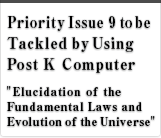Message from the Chief Officer
Development of the post-K computer, the next generation supercomputer after the K computer, is underway, aiming for its shared use to start in the 2020-21 fiscal year. The project to develop research and application programs for the post-K computer priority issues has begun in earnest in the 2016-17 fiscal year, in order to make cutting-edge achievements in various areas of science and technology.
Priority Issue 9 to be Tackled by Using the Post-K Computer—“Elucidation of the Fundamental Laws and Evolution of the Universe “ will mark an important step toward the major aim of elucidating the history of the creation of matters, which is an important subject in particle physics, nuclear physics and astrophysics. As the main organization responsible for this project, JICFuS is collaborating with numerous universities and institutes in Japan and is establishing close cooperation with major experimental and observational facilities. We will perform researches in computational fundamental sciences and develop necessary application programs on the post-K computer, utilizing scientific outcomes from the HPCI Strategic Program Field 5 and experiences we gained in the project management.
There are three sub-issues within Priority Issue 9. Sub-issue A is “Elucidating the ultimate laws of nature and the beginnings of the universe.” In this area, we will verify the Standard Model of elementary particles or find some signals beyond the Standard Model, understand a nature of the phase transition in the early universe, and analyze superstring theory, a possible candidate for the theory of everything. We will also enhance the level of collaborations with large-scale experimental projects such as SuperKEKB and J-PARC.
Sub-issue B is “Elucidating the history of the creation and conversion of matter,” an area that directly inherits the issues covered under SPIRE Field 5. We will aim to elucidate the phenomena of explosive stellar objects such as supernova explosions and binary neutron star mergers, and explore the mysteries of heavy element synthesis. We will cooperate with experimental and observational facilities such as J-PARC, RIBF, and KAGRA. In particular, we will help experimentalists extract as much valuable information as possible about the universe from gravitational waves, whose first observation was announced in 2016. Additionally, we will pursue fundamental research into nuclear conversion technology that is essential to nuclear waste processing.
Sub-issue C is “Elucidating the evolution of the universe by a combination of large-scale numerical calculations and wide-area observational data for the universe.” In this area, we will conduct simulations related the formation of celestial objects, including density fluctuations of dark matters, fluid dynamics and radiation transfer. Additionally, we will develop big data cosmology that merges observational data from the Subaru Telescope with large-scale simulations.
By tackling these issues, we will prepare scientific knowledges and application programs toward cutting-edge researches on the post-K computer, to elucidate the mysteries about the basic laws and evolution of the universe.
Chief Officer, Priority Issue 9 to be tackled by Using the Post-K Computer—Elucidation of the Fundamental Laws and Evolution of the Universe
April 2016





























